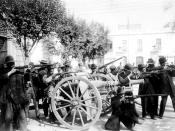Women of The Underdogs
Mariano Azuela's novel, The Underdogs, is a male-dominated novel. The story of the exploits and wartime adventures of a rebel band during the Mexican Revolution is primarily driven by men; the majority of the characters are men who are separated from their families and lives and who are fighting for a cause in which they strongly believe (at least at the beginning of the novel). Despite the masculine story, however, there are two highly developed and significant female characters in The Underdogs. These women, Camila and War Paint, are a representation of two of the roles women played during the Mexican Revolution. While the portraits Azuela paints of these women and their role in society and revolution are incredibly accurate, he does neglect the explore the other avenues of participation that women had in the revolution. Thus, Azuela semi-accurately portrays the roles that women played in the revolution during this time through the characters of Camila and War Paint.
Through these two women, the modern reader can achieve a sense of understanding as to two of the primary roles that women played during the revolution in the early 20th century. Camila is a young women who embodies a primarily domestic role, providing comfort, care and shelter to the rebel soldiers as so many women did during this time in Mexican history. War Paint provides a stark contrast to the mild Camila; as her name suggests, she is a fierce and hardened warrior, a soldadera.� Her role in the revolution is much different: she actually joins the ranks of the rebel band led by Demetrio Macias, and fights alongside the men. While the two women are highly developed characters who accurately represent the portion of society from which they come, there are many...


